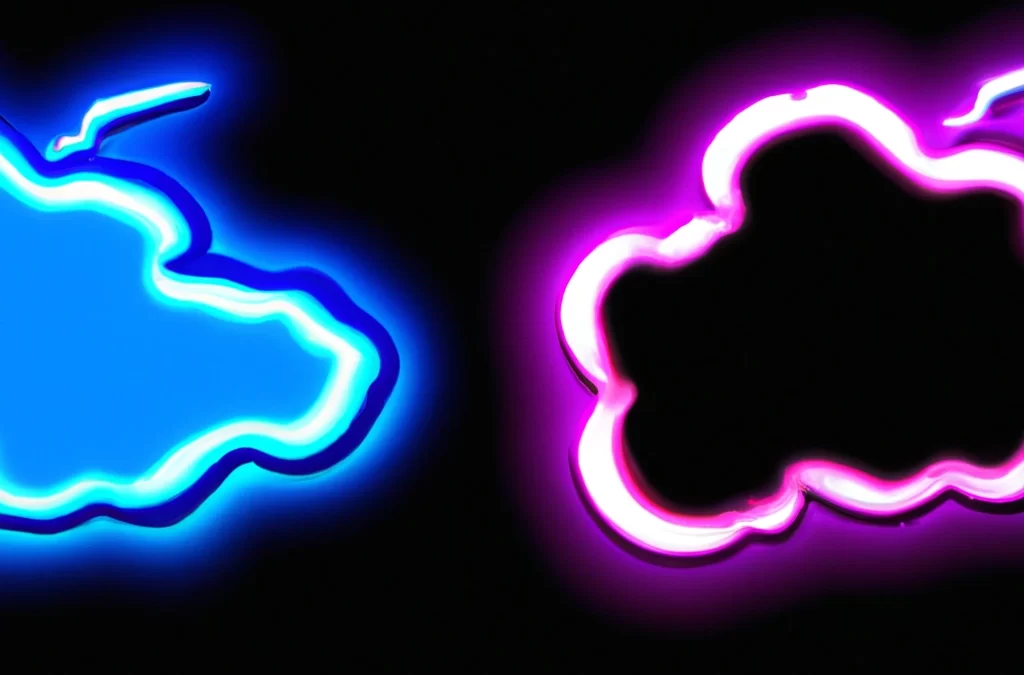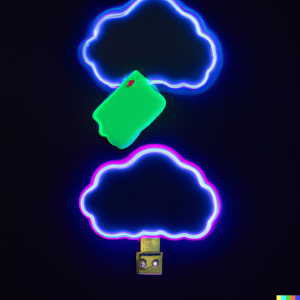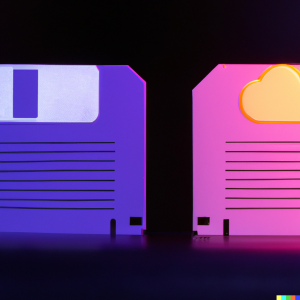In the digital age, storing data on-premise is becoming less popular as more businesses are moving their data to the cloud. Cloud storage services offer scalability, accessibility, and cost-effectiveness, making them an attractive option for businesses of all sizes. Azure Blob Storage and Google Cloud Storage are two popular cloud storage services that offer different features and benefits to their users. In this article, we will compare the two services to help you make an informed decision on which one to choose for your data storage needs.
Azure Blob Storage vs. Google Cloud Storage – An Overview
Azure Blob Storage is a cloud-based object storage service that enables users to store and manage unstructured data such as images, videos, audio files, and documents. It offers various features such as versioning, replication, and access control to help users manage their data effectively. On the other hand, Google Cloud Storage is a similar service offered by Google Cloud Platform that provides object storage, file storage, and block storage solutions to its users.
GCP and Azure Storage Types
Google Cloud Storage vs Azure Blob Storage:
Both GCP and Azure offer object storage options. Google Cloud Storage offers multi-regional, regional, and nearline storage classes, while Azure Blob Storage offers hot, cool, and archive storage tiers. GCP offers more flexibility in terms of storage classes and access tiers, while Azure Blob Storage offers lower costs for data stored in archive tier.
Google Cloud Filestore vs Azure Files:
Both GCP and Azure offer file storage options. Google Cloud Filestore offers high-performance, fully-managed NFS file storage, while Azure Files offers SMB file shares. Google Cloud Filestore is a better choice for applications that require high-performance file sharing, while Azure Files is a better choice for legacy applications that require SMB protocol.
Google Cloud Persistent Disk vs Azure Managed Disks:
Both GCP and Azure offer block storage options. Google Cloud Persistent Disk offers high-performance SSD and low-cost HDD options, while Azure Managed Disks offers Standard and Premium tiers with different performance and capacity options. Google Cloud Persistent Disk offers more granular control over disk performance and capacity, while Azure Managed Disks offer seamless integration with other Azure services.
Google Cloud Memorystore vs Azure Cache for Redis:
Both GCP and Azure offer in-memory data storage options. Google Cloud Memorystore offers fully-managed Redis and Memcached, while Azure Cache for Redis offers fully-managed Redis. Both services offer high-performance in-memory data storage and support for multiple Redis databases.
Google Cloud Spanner vs Azure Cosmos DB:
Both GCP and Azure offer globally distributed, highly-scalable NoSQL database options. Google Cloud Spanner offers horizontally scalable, ACID-compliant relational database, while Azure Cosmos DB offers multi-model, globally distributed database. Google Cloud Spanner is a better choice for applications that require transactional consistency and SQL-like query language, while Azure Cosmos DB is a better choice for applications that require multi-model support and seamless integration with other Azure services.
| Storage Type | Google Cloud Platform | Azure |
|---|---|---|
| Object Storage | Multi-regional, regional, nearline storage classes | Hot, cool, archive storage tiers |
| File Storage | Google Cloud Filestore – high-performance, fully-managed NFS file storage | Azure Files – SMB file shares |
| Block Storage | Google Cloud Persistent Disk – high-performance SSD and low-cost HDD options | Azure Managed Disks – Standard and Premium tiers |
| In-Memory Data Storage | Google Cloud Memorystore – fully-managed Redis and Memcached | Azure Cache for Redis – fully-managed Redis |
| NoSQL Database | Google Cloud Spanner – horizontally scalable, ACID-compliant relational database | Azure Cosmos DB – multi-model, globally distributed database |
GCP and Azure Storage Features and Benefits
Azure Blob Storage offers various features and benefits that make it an ideal choice for businesses looking for a reliable and scalable cloud storage solution. Some of the key features of Azure Blob Storage include:
Cost-Effective:
Azure Blob Storage offers a pay-as-you-go pricing model, which means users only pay for the storage they use, making it a cost-effective solution for businesses of all sizes.
Scalable:
Azure Blob Storage can scale up or down as per the user’s requirements, making it an ideal solution for businesses with fluctuating data storage needs.
Security:
Azure Blob Storage offers various security features such as data encryption, access control, and authentication to ensure the safety and privacy of user data.
Backup and Recovery:
Azure Blob Storage offers automatic backup and recovery options to help users recover their data in case of any disaster or data loss.
Google Cloud Storage also offers various features and benefits to its users. Some of the key features of Google Cloud Storage include:
Multi-Regional Storage:
Google Cloud Storage offers multi-regional storage options, which enables users to store their data in multiple regions for redundancy and availability.
Scalability:
Google Cloud Storage can scale up or down as per the user’s requirements, making it an ideal solution for businesses with fluctuating data storage needs.
Integration:
Google Cloud Storage integrates seamlessly with other Google Cloud Platform services, making it easy for users to manage their data in a single platform.
Security:
Google Cloud Storage offers various security features such as data encryption, access control, and audit logging to ensure the safety and privacy of user data.
| Feature | Azure Blob Storage | Google Cloud Storage |
|---|---|---|
| Durability | 11 nines | 11 nines |
| Availability | SLA of 99.9% | SLA of 99.95% |
| Access Tiers | Hot, cool, archive | Multi-regional, regional, nearline |
| Geo-Replication | Zone-redundant storage, geo-redundant storage, read-access geo-redundant storage | Multi-regional, regional |
| Data Transfer | Free inbound data transfers, outbound data transfer fees based on usage | Free inbound data transfers, outbound data transfer fees based on usage |
| Security | Encryption at rest and in transit, role-based access control | Encryption at rest and in transit, access control lists, signed URLs |
| Cost | Pay-as-you-go pricing, pricing based on usage, storage tier and data egress | Pay-as-you-go pricing, pricing based on usage, storage class and data egress |
GCP and Azure Storage Pricing Comparison
Azure Blob Storage and Google Cloud Storage both offer a pay-as-you-go pricing model, which means users only pay for the storage they use. However, the pricing structure of the two services differs slightly. Azure Blob Storage offers a standard pricing model, which charges users based on the amount of data stored, data egress, and data operations. On the other hand, Google Cloud Storage offers a flexible pricing model, which charges users based on the storage class, access frequency, and network usage.
This table provides a side-by-side comparison of the pricing for Azure Blob Storage and Google Cloud Storage, and highlights some of the key differences between them. The actual cost of using either service will depend on a variety of factors, including the amount of data stored, the frequency and volume of data transfers, and the frequency of operations such as read and write requests. It’s important to evaluate the pricing based on your specific use case and requirements.
For an estimate and comparison between Azure, AWS and GCP Cloud storage, you can use our Cost Estimator to get an idea on the pricing variations between the three big cloud vendors. As prices are always subject to change, it’s worth going to both the Azure Pricing Calculator and the Google Cloud Pricing Calculator for up to date to date pricing
| Pricing | Azure Blob Storage | Google Cloud Storage |
|---|---|---|
| Storage | $0.0184 – $0.045 per GB per month, based on storage tier and redundancy options | $0.020 – $0.026 per GB per month, based on storage class and redundancy options |
| Data Egress | $0.087 – $0.12 per GB, depending on data transfer volume | $0.12 – $0.23 per GB, depending on data transfer volume |
| Operations | First 10,000 operations per month free, then $0.004 per 10,000 operations | First 5,000 operations per month free, then $0.004 per 10,000 operations |
| Retrieval Fees | No retrieval fees for hot and cool tiers, $0.002 per GB for archive tier | No retrieval fees for multi-regional and regional storage classes, $0.01 per GB for nearline storage class, $0.05 per GB for archive storage class |
| Minimum Storage Duration | None | 30 days for multi-regional and regional storage classes, 90 days for nearline and archive storage classes |
GCP and Azure Use Cases
Azure Blob Storage and Google Cloud Storage can be used for various use cases, depending on the data storage needs of the business. Some common use cases for both services include:
-
Media Storage: Both Azure Blob Storage and Google Cloud Storage are ideal for storing and managing large media files such as images, videos, and audio files.
-
Backup and Archiving: Both services offer automatic backup and recovery options, making them ideal for businesses looking for a reliable backup and archiving solution.
-
Big Data Storage: Both services can be used for storing and managing big data sets, making them an ideal choice for businesses working with large amounts of data.
-
Web Content Storage: Both services can be used for storing and managing web content such as HTML, CSS, and JavaScript files.
-
IoT Data Storage: Both services can be used for storing and managing data generated by IoT devices, making them an ideal solution for businesses working with IoT data.
| Use Case | Azure Blob Storage | Google Cloud Storage |
|---|---|---|
| Cloud backup and disaster recovery | Zone-redundant storage, geo-redundant storage, read-access geo-redundant storage | Multi-regional, regional |
| Web content storage and delivery | Content Delivery Network (CDN) integration, static website hosting | Content Delivery Network (CDN) integration, static website hosting |
| Data archiving and long-term storage | Archive storage tier | Nearline and archive storage classes |
| Analytics and big data processing | Azure Data Lake Storage for big data analytics | BigQuery for big data analytics |
| File sharing and collaboration | Azure File Sync for hybrid cloud file sharing | Google Drive for cloud file sharing |
| Internet of Things (IoT) data storage | Event Grid for real-time data processing | Cloud Pub/Sub for real-time data processing |
This table provides a high-level comparison of some common use cases for Azure Blob Storage and Google Cloud Storage, and highlights some of the key strengths and differences between them. The best storage option for a particular use case will depend on a variety of factors, including the nature and volume of the data, the requirements for processing and analysis, and the desired access patterns and user experience
GCP and Azure FAQs
What is the difference between Azure Blob Storage and Google Cloud Storage?
Azure Blob Storage and Google Cloud Storage are two different cloud storage services offered by Microsoft and Google respectively. While both services offer similar features, their pricing models, and integration options differ slightly.
Which one is better – Azure Blob Storage or Google Cloud Storage?
The answer to this question depends on the specific data storage needs of the business. Azure Blob Storage is a good choice for businesses that require cost-effective, scalable, and secure storage options, while Google Cloud Storage is a good choice for businesses that require multi-regional storage options and seamless integration with other Google Cloud Platform services.
Can I use both Azure Blob Storage and Google Cloud Storage simultaneously?
Yes, it is possible to use both Azure Blob Storage and Google Cloud Storage simultaneously. This can be achieved by using third-party tools that offer cross-platform data management and migration services.
Both Azure Blob Storage and Google Cloud Storage are reliable and feature-rich cloud storage solutions that offer various benefits to their users. While both services offer similar features, they differ slightly in terms of pricing, integration, and storage options. Therefore, it is important for businesses to evaluate their specific data storage needs and choose a service that best fits their requirements. Ultimately, the decision between Azure Blob Storage and Google Cloud Storage comes down to the specific needs of the business, and there is no one-size-fits-all solution.
If you want to know how much Azure Storage you are consuming, give Cloud Storage Manager a trial. Cloud Storage Manager will show you in an easy to use console, exactly how much Azure Storage you are using, and where you can optimise and start saving money.
Azure Storage Unlocked
Send download link to:




